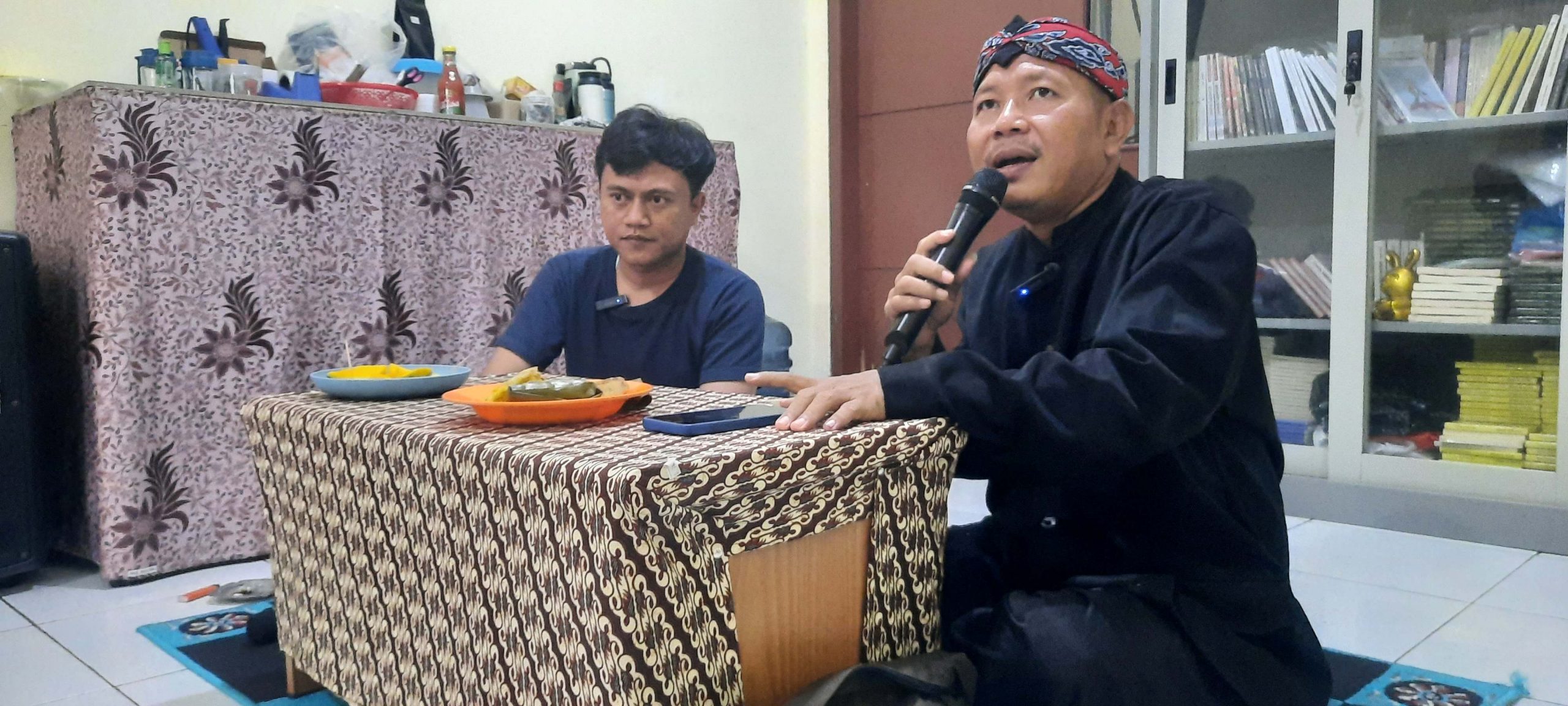Reported by: Napol Riel
In the cloudy atmosphere yesterday afternoon, Thursday, November 28, 2024, Umah Ramah again rolled out their carpet for the monthly discussion event Keprapag Maskulinitas. Around 11 people, including the Umah Ramah team, the resource person/discussion initiator Akbarudin Sucipto (Kang Akbar), and four young men from the Indramayu Student Family Association (Ikatan Keluarga Mahasiswa Indramayu; IKMI) Cirebon, sat together in a warm atmosphere, despite the cold air outside. This sixth discussion focused on the concept of sexuality in Cirebon tradition related to the terms “Sandang, Sanding, Sandung“.
The rain suddenly began to fall and intensified. Hadid began the event by introducing this limited group monthly discussion, particularly to the four young men from IKMI who were new participants. He also introduced Kang Akbar, a Cirebon cultural activist who has worked as an MC for weddings, proposals, and handing over and receiving prospective brides and grooms, as well as witnessing divorces, over 500 times since 1995.
The sixth discussion of Keprapag Maskulinitas delves into how sexuality is perceived in Cirebon. Given that sexuality does not emerge from an empty space, but is linked to space and time, as well as traditions and culture specific to a location. Also, sexuality is more than just sexual relationships, the body, or biology. Sexuality is a broad term that refers to all aspects of human life involving relationships with one’s body.
“Sandang, Sanding, Sandung” is a term in the context of sexuality that Javanese people, including those in Cirebon, are familiar with. This term is used in Javanese proverbs to describe marriage relationships, with the husband and wife using it as “guidance” in navigating household life. In Cirebon, this term is also used in the lyrics of tarling songs. The song’s lyrics, known to have been written by a man, are sung by local Cirebon female artists: Iwi S. and Nunung Alvi.
Kang Akbar shares his decades of experience witnessing hundreds of couples’ weddings, divorces, and personal marriage experiences. He also shared his experiences while conducting related research.
“In 2001, I accompanied a friend to conduct research on violence against women. In the field, I heard a term that referred to women who had experienced domestic violence: ‘Turuk bodol langka tilase‘ (The vagina is damaged without a trace). Kang Akbar questioned why the terms used in cases of marital violence degrade women’s bodies.
He also discovered other terms in society that refer to women’s sexualized bodies, such as botok dage (bokong montok, dada gede; puffy buttocks, large breasts), kutilang dara (kurus tinggi langsing dada rata; thin, tall, slim, flat-chested), and others. Meanwhile, he rarely heard terms about men’s bodies.
According to Kang Akbar, the emergence of derogatory terms that place women’s bodies in a subordinate position reflects society’s reality, which is that the male perspective continues to dominate the bodily relationship between men and women. Women’s bodies are still frequently sexualized, both by men and by women themselves.
He rarely found discussions about sexuality in local communities, even among married couples. Whether it felt embarrassing, awkward, or obscene, it has always been considered taboo.
“In Cirebon society, when discussing this chapter (marriage relationships), the jokes are very loud. For example, if a husband is unable to provide for his family, his male friends at the hangout usually tease him, ‘Aja-aja balike cuma dipai bokong’ (maybe when he goes home he will only be given a butt),” he continued.
He also found similar jokes at the wedding ceremony when the MC said, “Wah, pengantene wis bli sabar (the bride can’t wait)…” Implying that marriage is still seen as merely a “legal door” to having sex.
This is also implied by the phrase “sandang, sanding, sandung“. Sandang implies that the husband is expected to meet his wife’s needs (sandang means clothing), to be able to sanding (accompanies her), and then sandung (have sex with her).
Before the discussion continued, one of the participants, Abdul Rosyidi, delivered a critique, stating that when reading the concept of “sandang, sanding, sandung“, as with any text, we must also consider the meta-text.
“The concept in any text in a cultural context does not appear out of nowhere. Before we use the concept as a guideline, let’s try to read it critically. The lyrics of the well-known tarling song ‘Sandang Sanding‘ include demands on both men and women. The song was written by a man and sung by a woman, giving the impression that the woman is the one who ‘wants’ it,” he stated firmly.
The discussion continued with a series of responses and questions. Another participant, Asih, answered Kang Akbar’s question about women’s sexual needs after menopause.
“According to the stories of several women I’ve accompanied, the need persists after menopause, even though reproductive activity has ceased due to the lack of egg production. Human sexuality and its needs, male or female, will exist as long as they live,” Asih said, emphasizing that the concept of sandang, sanding, sandung is not complete by simply adding the word ‘saling’ (mutual), given today’s deep-rooted patriarchal mindset.
Other related discussions continued into the evening, including the definition of “sufficient” in household needs and who determines it. Stories about Cirebon undercover (old stories about Cirebonese sexuality that contradict the city’s image as a Kota Wali (City of Saints), as well as other exciting discussions. []
This article was translated by Napol Riel.
